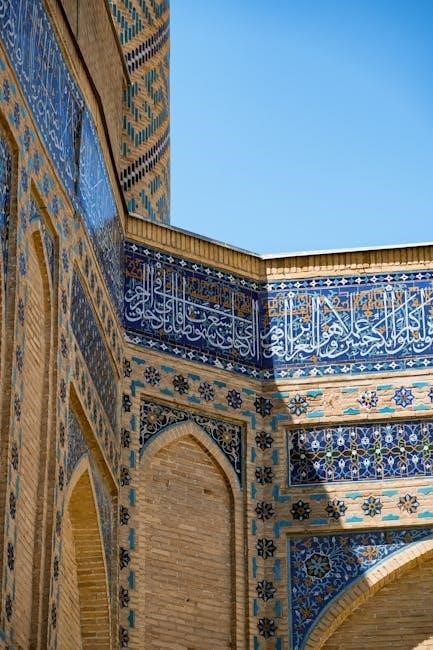Business Arabic is a vital tool for professionals engaging in global commerce‚ particularly in Arab-speaking regions․ It combines language skills with cultural understanding‚ facilitating effective communication in trade‚ finance‚ and international relations․ Historically‚ Arabic has played a significant role in shaping global business practices‚ and its modern applications continue to grow in importance․ Mastering Business Arabic enhances one’s ability to navigate the complexities of Arab markets‚ fostering stronger business relationships and economic collaborations․
What is Business Arabic?
Business Arabic refers to the specialized use of the Arabic language in professional and commercial contexts․ It combines linguistic skills with cultural understanding‚ enabling effective communication in Arab-speaking business environments․ This includes vocabulary‚ phrases‚ and etiquette tailored to industries like finance‚ marketing‚ and law․ Business Arabic is essential for professionals engaging with Arab markets‚ facilitating negotiations‚ drafting contracts‚ and building relationships․ It is taught in various educational programs and supported by textbooks like Arabe des Affaires by Nejmeddine KHALFALLAH․ Mastery of Business Arabic enhances global trade interactions and fosters mutual understanding between Arab and non-Arab business partners․ Its importance grows as Arab economies increasingly influence international commerce and organizations like the Arab League and GCC countries play pivotal roles in global trade․
Importance of Business Arabic in Global Commerce
Business Arabic is crucial for navigating the vast and influential Arab market‚ which plays a significant role in global trade․ With 22 Arab countries forming a substantial economic bloc‚ proficiency in Business Arabic facilitates access to lucrative opportunities in industries like oil‚ finance‚ and technology․ It enables effective communication with Arab business partners‚ fostering trust and collaboration․ Moreover‚ Arabic is the official language of key international organizations such as the Arab League and OPEC‚ making it essential for professionals in these sectors․ As Arab economies grow‚ mastering Business Arabic becomes a competitive advantage‚ allowing businesses to tap into emerging markets and strengthen global trade relations․ It also bridges cultural gaps‚ ensuring successful negotiations and long-term partnerships in the Arab world․
Historical Development of Business Arabic
Business Arabic has evolved significantly over centuries‚ rooted in the Islamic Golden Age when Arabic became a lingua franca for trade and scholarship․ By the 20th century‚ the rise of Arab nationalism and economic growth spurred the development of a standardized Business Arabic‚ blending classical Arabic with modern terminology․ This evolution was driven by the need for a unified language in commerce‚ finance‚ and international relations across Arab countries․ The creation of organizations like the Arab League and OPEC further solidified its role in global business․ Today‚ Business Arabic is indispensable for professionals engaging with Arab markets‚ reflecting its historical transformation from a scholarly language to a dynamic tool for modern commerce and diplomacy․

Key Concepts in Business Arabic
Key concepts in Business Arabic include essential vocabulary for professional communication‚ common phrases used in meetings‚ and understanding cultural etiquette in Arab business environments․ These elements ensure effective professional interactions in Arab markets․
Essential Vocabulary for Business Communication
Mastering essential vocabulary is crucial for effective business communication in Arabic․ Key terms include entreprise (company)‚ banque (bank)‚ bureau (office)‚ and employé (employee)․ Understanding these words facilitates professional interactions and document preparation․ Additional terms like salaire (salary) and assurance (insurance) are vital for discussions on employment and financial matters․ These vocabulary elements are fundamental for drafting business letters‚ emails‚ and reports in Arabic‚ ensuring clarity and professionalism in all communications․
Common Phrases Used in Business Meetings
In business meetings‚ certain Arabic phrases are frequently used to ensure effective communication․ Greetings like “Marhaban‚ kayfa haluka?” (Hello‚ how are you?) and “Sabah al-khayr” (Good morning) are essential․ Phrases such as “Nadhra jadid al-muwadha‘at” (Let’s discuss the new proposals) and “Ma hi al-khutuwah al-jadida?” (What’s the new plan?) facilitate agenda setting․ Expressions like “Na‘tabaray al-tafasil” (Let’s review the details) and “Hal nataqanat ila ittifakiya?” (Have we reached an agreement?) are crucial for decision-making․ Closing phrases‚ such as “Shukran li-hadithkum” (Thank you for your discussion) and “Liqa’ jadid ghadan” (Another meeting tomorrow)‚ ensure professional closure․ These phrases are vital for maintaining clarity and professionalism in Arabic business interactions․
Understanding Business Etiquette in Arab Countries
Understanding business etiquette in Arab countries is crucial for successful interactions․ Respect for hierarchy and traditions is paramount․ Greetings often involve handshakes and the use of formal titles like “Sayyid” (Mr․) or “Sayyida” (Mrs․/Ms․)․ The Arabic greeting “As-salamu alaykum” (Peace be upon you) is widely respected․ Dining etiquette requires refraining from eating with the left hand and waiting for the host to begin․ Business meetings often start with small talk‚ emphasizing personal relationships․ Punctuality is valued‚ but flexibility is also expected․ Avoid public criticism or disagreement‚ as maintaining dignity is essential․ Dress modestly‚ with men typically wearing suits and women covering their hair․ Removing shoes in traditional settings is customary․ These cultural nuances foster trust and smooth business operations in Arab countries․
Business Arabic in Education
Business Arabic courses‚ such as ‘Conseil arabe des Affaires’ at the University of Nanterre‚ use textbooks like ‘Arabe‚ langue des affaires’ to improve business communication․
Courses and Programs Offering Business Arabic
Various institutions offer specialized courses in Business Arabic‚ such as the Conseil arabe des Affaires program at the University of Nanterre․ These programs focus on practical skills‚ including business communication‚ vocabulary‚ and cultural understanding․ Textbooks like ‘Arabe‚ langue des affaires’ by Nejmeddine KHALFALLAH are widely used to teach essential concepts․ Courses are often designed for professionals and students‚ providing tools to navigate Arab business environments effectively․ They typically include topics such as writing business letters‚ understanding financial terminology‚ and preparing presentations․ Many programs also emphasize the importance of cultural nuances in Arab business interactions‚ ensuring a comprehensive learning experience․
Textbooks and Resources for Learning Business Arabic
Key resources for mastering Business Arabic include textbooks like “Arabe‚ langue des affaires” by Nejmeddine KHALFALLAH‚ which focuses on practical vocabulary and communication skills․ Vocabulary lists covering essential terms such as entreprise (company)‚ banque (bank)‚ and bureau (office) are widely used․ Many universities‚ like the University of Nanterre‚ offer specialized courses with tailored materials․ Online platforms and guides‚ such as those from the Canada-UAE Business Council‚ provide insights into Arab business practices․ These resources emphasize cultural nuances and professional communication‚ making them invaluable for learners․ They are designed to equip students and professionals with the skills needed to thrive in Arab business environments‚ ensuring a comprehensive understanding of both language and culture․
Language Schools Specializing in Business Arabic
Prominent institutions like the University of Nanterre and the Arab League’s cultural centers offer specialized programs in Business Arabic․ These schools provide tailored courses focusing on professional communication‚ with ECTS credits for structured learning; The University of Nanterre‚ for instance‚ offers modules in Arabe des affaires with practical workshops․ Additionally‚ organizations like BibAlex in Alexandria and language centers affiliated with the Arab League cater to learners seeking to master business-specific Arabic․ These programs often include cultural immersion and real-world application‚ ensuring learners gain both linguistic proficiency and cultural insights․ Such specialized schools are essential for professionals aiming to excel in Arab business environments‚ blending academic rigor with practical skills․

Arabic for Specific Business Purposes
Arabic for Specific Business Purposes tailors language learning to professionals in finance‚ banking‚ and legal sectors‚ enhancing communication in specialized business environments․
Arabic for Finance and Banking
Arabic for Finance and Banking focuses on specialized vocabulary and terminology essential for professionals in banking‚ accounting‚ and financial sectors․ Understanding concepts like financial reports‚ balance sheets‚ and investment strategies in Arabic is crucial for operating effectively in Arab markets․ The language also plays a key role in drafting contracts‚ agreements‚ and legal documents‚ ensuring compliance with regional regulations․ Cultural nuances in financial communication are equally important‚ as they influence business relationships and decision-making processes․ Mastery of Arabic in finance and banking enables professionals to navigate the complexities of economic transactions‚ fostering trust and collaboration in a globalized economy․
Arabic for Marketing and Advertising
Arabic for Marketing and Advertising is tailored to professionals seeking to effectively communicate and promote products in Arab-speaking markets․ It focuses on mastering vocabulary related to branding‚ consumer behavior‚ and market analysis․ Understanding cultural nuances ensures campaigns resonate with local audiences‚ avoiding misunderstandings․ Key concepts include crafting persuasive advertisements‚ developing marketing strategies‚ and analyzing consumer trends․ Fluency in Arabic enhances the ability to create compelling content for digital platforms‚ social media‚ and traditional media․ This expertise is vital for businesses aiming to expand in regions where Arabic is predominant‚ ensuring successful brand positioning and customer engagement in a competitive global marketplace․
Arabic for Legal and Contractual Affairs
Arabic for Legal and Contractual Affairs is essential for professionals navigating the complexities of law and business in Arab-speaking regions․ It emphasizes precise language and cultural nuances to ensure accurate interpretation of legal documents․ Key areas include contract drafting‚ legal agreements‚ and courtroom procedures․ Understanding Arabic legal terminology is crucial for avoiding misunderstandings and ensuring compliance with local laws․ This expertise is particularly valuable in international business dealings‚ where legal accuracy and cultural sensitivity are paramount․ Mastery of Arabic in legal contexts facilitates effective communication between parties‚ ensuring that agreements are clear‚ binding‚ and enforceable․ It is a cornerstone of professional competence in regions where Arabic is the primary language of legal and contractual affairs․
Business Communication in Arabic
Business Communication in Arabic focuses on effective workplace interactions‚ emphasizing clear expression and cultural sensitivity․ It includes mastering essential vocabulary‚ formal tones‚ and understanding regional dialects for professional efficiency and rapport-building․
Writing Business Letters and Emails in Arabic
Writing business letters and emails in Arabic requires a blend of linguistic skills and cultural understanding․ It involves using appropriate greetings‚ formal tones‚ and structured formats to convey professionalism․ Essential vocabulary includes terms like الشركات (companies)‚ ال работе (work)‚ and الفرص (opportunities)․ The structure typically includes headings‚ a greeting‚ the main body‚ and a closing․ Understanding regional dialects and nuances is crucial for clarity․ Common phrases like مع فائق الاحترام (with highest respect) and في إنتظار ردكم (awaiting your response) are frequently used․ Practicing these elements ensures effective communication in Arab business environments․ Resources such as textbooks and online courses provide comprehensive guidance for mastering this skill․
Preparing Business Presentations in Arabic
Preparing business presentations in Arabic requires a structured approach to ensure clarity and professionalism․ It involves using appropriate vocabulary‚ such as الشركات (companies) and التحليل (analysis)‚ and organizing content with headings and bullet points․ Cultural considerations‚ like respecting hierarchy and using formal language‚ are essential․ Visual aids‚ including charts and graphs‚ enhance comprehension․ Practicing common phrases like السلام عليكم (hello) and شكراً لك (thank you) helps engage audiences․ Resources like textbooks and online guides provide templates and tips for crafting effective presentations․ Mastering these elements ensures impactful communication in Arab business settings‚ fostering successful outcomes in professional environments․
Negotiation Techniques in Arabic
Negotiation in Arabic-speaking business environments requires a blend of cultural understanding and strategic communication․ Key techniques include building trust through polite greetings like السلام عليكم (peace be upon you) and using formal language to show respect․ Understanding phrases such as كلما همت برahat (the more you concessions‚ the more likely agreement) highlights the importance of compromise․ Non-verbal cues‚ like firm handshakes and direct eye contact‚ also play a role․ Additionally‚ mastering terms like التفاوض (negotiation) and التوصل إلى اتفاق (reaching an agreement) is essential․ Practicing these techniques ensures effective communication and fosters successful business relationships in Arab professional contexts․

Arabic in International Business Relations
Arabic is crucial in international business relations‚ facilitating trade and diplomacy across Arab-speaking regions․ It bridges cultural gaps‚ enabling effective communication and fostering economic partnerships globally․
Role of Arabic in Global Trade
Arabic plays a pivotal role in global trade‚ serving as a bridge for business communication across Arab-speaking regions․ It facilitates international transactions‚ particularly in industries like finance‚ marketing‚ and legal affairs․ As a widely spoken language‚ Arabic connects diverse markets‚ enabling companies to access lucrative opportunities in the Middle East and North Africa․ Its importance is evident in global organizations like OPEC and the Arab League‚ where Arabic is a primary language for negotiations and agreements․ Additionally‚ Arabic fosters cultural understanding‚ which is crucial for building trust and long-term partnerships in global trade․ As international businesses expand into Arab markets‚ proficiency in Arabic becomes increasingly vital for successful trade relations and economic growth․
Arabic-Speaking Markets: Opportunities and Challenges
Arabic-speaking markets present significant opportunities for global businesses‚ driven by growing economies and a young‚ dynamic population․ Industries such as energy‚ finance‚ and technology are thriving‚ particularly in Gulf Cooperation Council (GCC) countries․ However‚ navigating these markets requires understanding cultural nuances and language barriers․ Challenges include regulatory complexities‚ varying business practices‚ and political instability in some regions․ Additionally‚ competition from local enterprises and the need for tailored marketing strategies can pose difficulties․ Despite these hurdles‚ the potential for growth in sectors like tourism‚ healthcare‚ and education remains substantial․ Proficiency in Arabic and cultural awareness are key to unlocking these opportunities and overcoming challenges in Arab-speaking markets․
Cultural Considerations in Arab Business Environments
Cultural awareness is crucial when conducting business in Arab-speaking countries․ Understanding Islamic traditions‚ such as Ramadan‚ and respecting local customs is essential․ Building personal relationships and trust is highly valued‚ often preceding formal business discussions․ Non-verbal cues‚ like hand gestures and direct eye contact‚ are important but must be approached sensitively․ Decisions may take time‚ as they often involve senior officials․ Language plays a significant role‚ with Arabic being the preferred medium for communication․ Adapting to these cultural norms fosters mutual respect and strengthens business partnerships․ Ignoring these considerations can lead to misunderstandings and hinder collaboration․ Therefore‚ cultural sensitivity is key to navigating Arab business environments effectively․

Arabic Language and Economic Organizations
Arabic plays a pivotal role in economic organizations across the Arab League and GCC countries‚ facilitating trade‚ policy-making‚ and regional cooperation․ Its use strengthens economic integration and collaboration․
Arabic in the Arab League and Economic Integration
The Arabic language is the official medium for communication within the Arab League‚ fostering economic integration among member states․ It facilitates trade agreements‚ policy discussions‚ and joint projects‚ ensuring a unified approach to regional development․ The Arab League’s initiatives‚ such as the Greater Arab Free Trade Area‚ rely heavily on Arabic for negotiation and documentation․ Additionally‚ Arabic serves as a bridge for cultural and economic exchanges‚ promoting a shared identity and cooperation․ Its role is central in aligning economic strategies‚ enhancing collaboration‚ and achieving sustainable growth across the Arab world․
Role of Arabic in GCC (Gulf Cooperation Council) Countries
In GCC countries‚ Arabic is the primary language for official communications‚ business transactions‚ and legal frameworks․ It plays a crucial role in fostering economic unity among member states‚ such as Saudi Arabia‚ UAE‚ and Qatar․ Arabic facilitates trade negotiations‚ policy-making‚ and the creation of joint economic initiatives․ The language is integral to the GCC’s vision of regional integration‚ ensuring smooth collaboration in sectors like energy‚ finance‚ and infrastructure․ Additionally‚ Arabic is essential for cultural preservation and identity in GCC nations‚ reinforcing shared values and traditions․ Its prominence supports the Council’s goals of economic diversification and sustainable development‚ making it indispensable in the region’s business landscape․
Arabic in International Organizations Like OPEC
Arabic plays a significant role in international organizations like OPEC‚ where it serves as an official language alongside English․ This reflects the cultural and economic influence of Arab member states within these organizations․ Arabic is used in official meetings‚ documents‚ and communications‚ ensuring clarity and accuracy in discussions about global energy policies․ Its prominence facilitates collaboration among member countries‚ many of which are Arabic-speaking․ Moreover‚ Arabic supports the organization’s goals of promoting energy cooperation and market stability․ The use of Arabic in OPEC underscores the importance of linguistic diversity in addressing global challenges and aligns with the organization’s commitment to fostering dialogue and understanding among its diverse membership․
Future Trends in Business Arabic
Business Arabic is evolving with digitalization‚ AI‚ and expanding markets‚ enhancing its role in global trade and economic growth across Arabic-speaking regions․
Digitalization and Business Arabic
Digitalization is transforming Business Arabic‚ enabling efficient communication and commerce in Arab-speaking regions․ Online platforms and tools now offer robust resources for learning and applying Business Arabic‚ such as translation apps‚ e-commerce solutions‚ and digital dictionaries․ The rise of AI-powered language tools enhances accuracy and speed in translating business documents and correspondence․ Additionally‚ digitalization fosters global connectivity‚ allowing businesses to engage seamlessly with Arab markets․ Virtual classrooms and multimedia resources are revolutionizing how professionals learn Business Arabic‚ making it more accessible․ As technology advances‚ the integration of Business Arabic into digital workflows ensures its relevance in modern trade and diplomacy‚ bridging cultural and linguistic gaps in the global economy․
Impact of AI on Learning Business Arabic
AI is revolutionizing the learning of Business Arabic by offering personalized and interactive tools․ Language learning apps now incorporate AI to provide real-time feedback‚ improving pronunciation and grammar․ AI-driven platforms analyze learner progress‚ tailoring exercises to individual needs․ Chatbots simulate business conversations‚ enhancing practical skills․ Additionally‚ AI facilitates access to authentic materials‚ such as business documents and news articles‚ for immersive learning․ This technology also bridges gaps for learners in remote areas‚ connecting them to expert instructors virtually․ The integration of AI in Business Arabic education not only accelerates learning but also prepares professionals for the demands of modern‚ tech-driven global commerce․ As AI continues to evolve‚ its role in refining Business Arabic skills will grow‚ ensuring learners are well-equipped for future challenges․
Expanding Business Arabic for Emerging Markets
Expanding Business Arabic into emerging markets is crucial for tapping into the growing economies of Arab-speaking countries․ As global trade increases‚ the demand for professionals fluent in Business Arabic rises‚ enabling companies to navigate diverse markets effectively․ Regions like Africa and Asia present significant opportunities‚ where Arab investments are flourishing․ Tailoring Business Arabic programs to these markets involves adapting curricula to address local business norms and cultural nuances․ Technology plays a key role‚ with online platforms making learning accessible․ This expansion not only fosters economic ties but also promotes cross-cultural understanding․ By aligning Business Arabic education with market needs‚ professionals gain a competitive edge‚ driving sustainable growth and collaboration in these dynamic regions․
